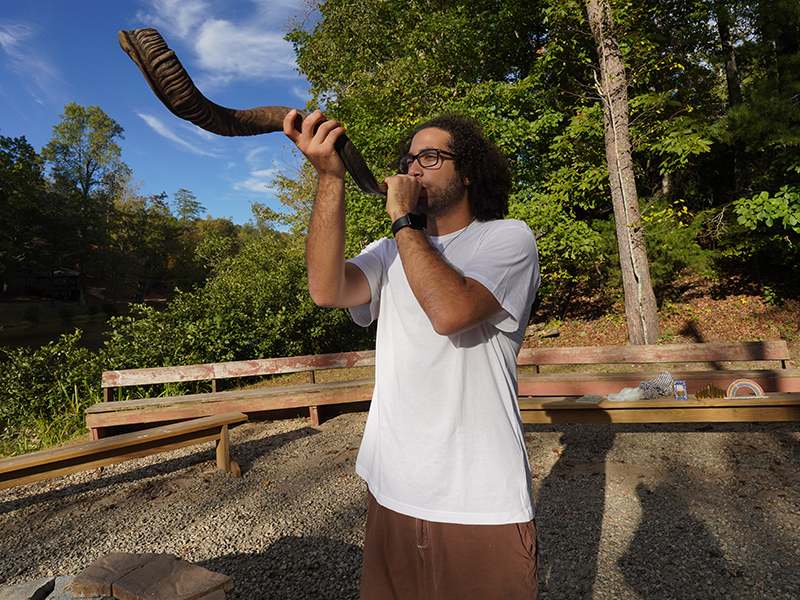Chayei Sarah poses an interesting dichotomy between life and death. The literal translation of the title is "Sarah's Life"; however, when we begin reading the parshah, Sarah has died and Abraham is finding a burial place for her. We begin the parshah with a dialogue between Abraham and the Hittites, specifically Ephron, discussing the purchase of the cave of Machpelah to become Sarah's resting place. When Abraham asks Ephron to take his 400 shekels, the average price of such a plot of land, Ephron refuses and says "My lord, hear me: land worth 400 shekels of silver - what is it between you and me? Go bury your dead!" (Genesis 23:15) Against Ephron's wishes, Abraham pays him 400 shekels and respectfully buries Sarah.
The next, and I feel most important part of this parshah, is the marriage of Isaac to Rebekah. Abraham sends his most trusted servant to find a wife for Isaac in the city of Nahor, which is Rebekah's home. The way the servant was going to find a wife for Isaac was by a test of compassion. When Rebekah approaches the servant and offers both him and his camels water, he knew that she was destined to be the wife of Isaac and brings her back to Canaan to wed. Although Sarah had just died, Isaac fell in love with Rebekah and married her.
Sarah was Isaac's teacher, teaching him to find his own personal relationship with God (which according to tradition, Isaac found through meditation), to respect his wife, to make a family and to carry on the traditions of Judaism in which he was raised. Sarah's impact on Isaac's life led to his devotion to Rebekah, and he was able to both mourn and be comforted at the same time. Typically one would find it strange to engage in such a joyous event as marriage shortly after the death of someone so important as a mother, but Isaac uses this opportunity to take what Sarah taught him and apply it to his life.
This portion begins with the death of Sarah, but it is more about the legacy she left with Isaac to carry on through the Jewish people to come.
Related Questions
- In 1996, Rabbi Simeon Maslin of Congregation Keneseth Israel in Elkins Park, PA wrote a Torat Hayim for this parshah. In his review of the parshah, he posed this question:
"What moral did the rabbis find in the title "The life of Sarah?" They taught that "the righteous are called living even after death, while the wicked are called dead even in life." I find that the easiest way to answer this question is to look at the facts. Righteous people not only live righteous and virtuous lives, but teach others to emulate their actions and find righteousness within their own lives. After the righteous pass, their memory still lives on within the minds and hearts of those who have learned from them, keeping their righteous and positive spirit alive. The opposite approach to this idea is that the wicked spread misery and promote wrong-doings in life, therefore in death they are remembered for the negative impact they made on the world.
- How does Kaddish Yatom reflect Chayei Sarah?
Kaddish Yatom (Mourner's Kaddish) is the prayer one says when mourning the death of a loved one. The title insinuates that the prayer is all about death, while in reality Kaddish Yatom celebrates life. In Chayei Sarah we celebrate the life of Sarah through Isaac's marriage. Although Isaac was in a period of mourning, he was able to embrace the lessons that Sarah taught him during her life, and apply them to his marriage to Rebekah. Both Chayei Sarah and Kaddish Yatom focus on celebrating life rather than mourning death.
Taking Action
- When in doubt, listen to Aretha: R-E-S-P-E-C-T.
Respect is an integral value that many people forget, and it is something that Sarah ingrained in Isaac. Not only respect for others, but respect for yourself and respect for God. Today we see a lot of examples of disrespect through television, music, movies and politics. Maybe we can't overthrow the media and government and get them to relearn the concept of respect, but we can take small steps to integrate respect into our lives and communities. Look around you and see where respect is lacking. Respect your family, respect your friends and respect yourself.
Food For Thought
What have you learned from your parents that has helped you form relationships? How do the actions that Abraham and Isaac took honor Sarah and celebrate her life? What have you done to celebrate the lives of your loved ones who have passed?
Chayei Sarah, Genesis 23:1–25:18
The Torah: A Modern Commentary, pp. 156–167; Revised Edition, pp. 153–167;
The Torah: A Women's Commentary, pp. 111–132
Explore Jewish Life and Get Inspired
Subscribe for Emails

